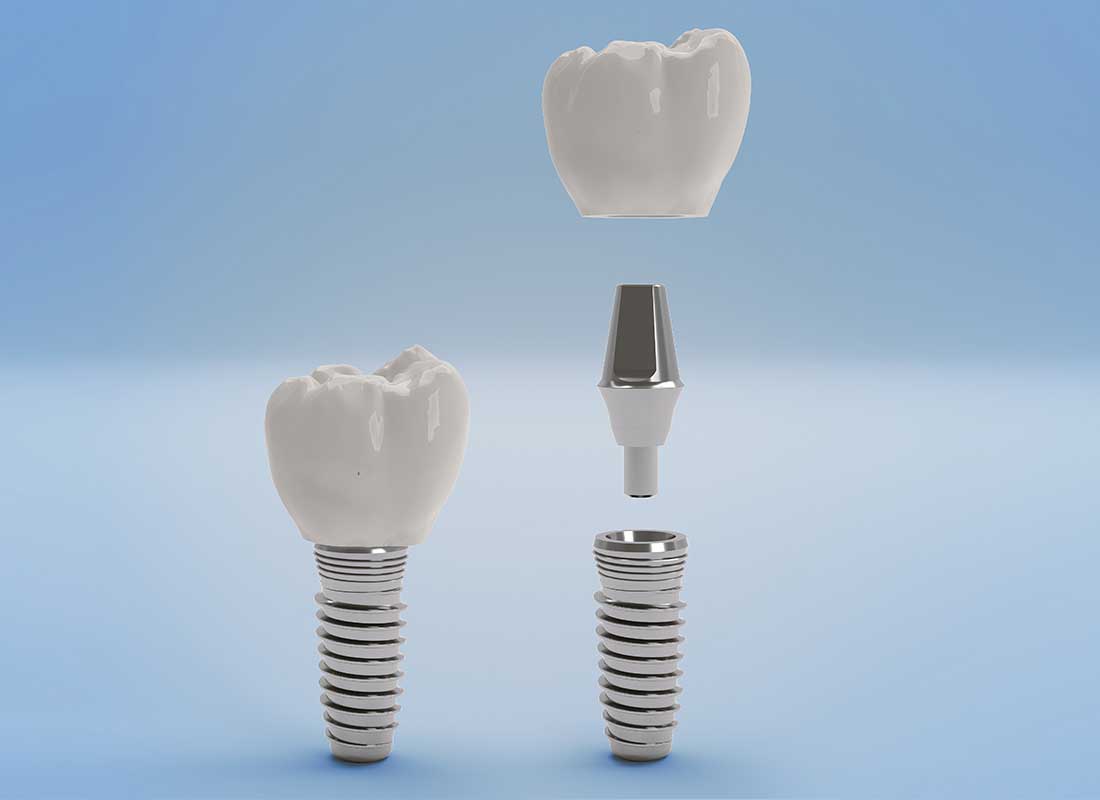-
How do dental implants work?
Dental implants are like artificial tooth roots, typically made of titanium, that are surgically placed into your jawbone. They work by fusing with your natural bone over time, a process called osseointegration. Once integrated, these implants provide a sturdy base for attaching replacement teeth, called crowns. This innovative solution not only looks and feels natural but also helps maintain jaw structure and restore full chewing function, offering a long-lasting alternative to dentures or bridges.
-
What are the benefits of dental implants over traditional dentures?
Unlike removable dentures, implants provide a permanent, natural-looking solution that feels and functions like real teeth. They preserve jawbone health, prevent facial sagging, and allow you to eat, speak, and smile with confidence. Implants also eliminate the need for messy adhesives and uncomfortable adjustments.
-
Can anyone with a tooth missing have a dental implant fitted?
Generally, good oral health, adequate bone density in the jaw, and healthy gums are prerequisites. A thorough evaluation by our dentist will be essential to determine if implants are suitable for your specific case.
-
Is the dental implant fitting procedure painful?
Your dentist will use local anaesthestic to numb the area. Many patients report feeling pressure rather than pain during the process. After the procedure, mild soreness is common but easily managed with over-the-counter pain relievers.
-
How much recovery time will I need?
Recovery time after dental implant surgery varies for each patient, but generally spans a few months. Most people return to normal activities within a day or two. The bone healing process, called osseointegration takes 3-6 months. During this time, your dentist will monitor your progress closely.
-
How many dental implants are needed to hold a full set of dentures in place?
Did you know that you don’t need an implant for every tooth to secure a full set of dentures? Typically, 4 to 6 dental implants are sufficient to hold a complete arch of dentures in place. This innovative approach, known as implant-supported dentures, provides a stable and comfortable solution for those missing all their teeth. The exact number of implants may vary based on factors like jaw bone density and overall oral health.
-
How long will my dental implant last?
With proper care, implants can last a lifetime. Their longevity depends on factors like oral hygiene, lifestyle habits, and regular dental check-ups. While the implant itself can last decades, the crown may need replacement after 10-15 years.

Brookview Dental
Dental Implants Overview
Dental implants are a solution for missing teeth. They offer a permanent and natural-looking replacement that can transform your smile and boost your confidence. These titanium roots seamlessly integrate with your jawbone, providing a sturdy foundation for custom-made crowns. At Brookview dental clinic, our experienced dentists utilise cutting-edge implant technology to ensure precise placement and optimal results, not to mention a new beautiful, confident smile!
Permanent solution
A false tooth that looks like the real thing and won’t fall out
Dental implants are like high-tech root replacements for missing teeth. A small titanium post is surgically placed into the jawbone, to act as a sturdy anchor. Over time, the bone fuses with the implant, creating a rock-solid foundation. A lifelike crown is then attached to the post, restoring both function and appearance. You’ll be able to eat, speak, and smile with confidence again.
- Natural looking replacement teeth
- Feels like natural teeth
- Long lasting and durable
- Multiple implants can be used to anchor a full set of dentures securely into the mouth
- They stimulate the jawbone to prevent the bone loss that occurs when teeth are missing

Our Treatment Process
1. Your Consultation
Our dentist will thoroughly assess your oral health and discuss your treatment goals. They’ll examine your teeth, gums, and jawbone, often using X-rays or 3D scans for a detailed view. You’ll learn about the implant process, including any necessary preparatory procedures like bone grafting, as well as have all your questions answered.

Our Treatment Process
2. Your Treatment
Firstly our dentist will administer local anaesthetic to numb the area. Using precise tools, they’ll create a small opening in your jawbone to place the implant. This titanium post will serve as an artificial tooth root. The process is usually quick and painless.

Our Treatment Process
3. Aftercare
Proper aftercare is crucial for the success of your dental implants. In the days following surgery, gentle care is essential. Rinse with salt water, avoid hard foods, and manage swelling with ice packs. As you heal, maintain impeccable oral hygiene by brushing twice daily and flossing carefully around the implant. Regular dental check-ups are vital for long-term success.

Frequently Asked Questions
Your Questions Answered
Contact Us
Get In Touch Today
To find out if you’d be a suitable candidate for dental implants, please get in touch and book a consultation with us.





